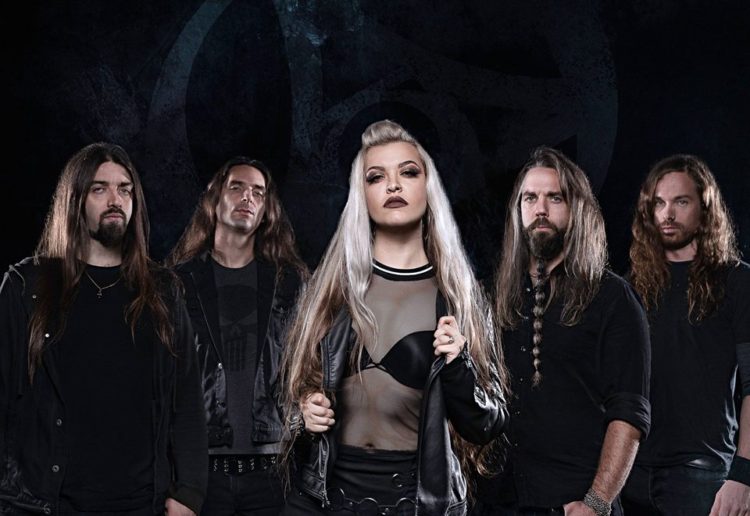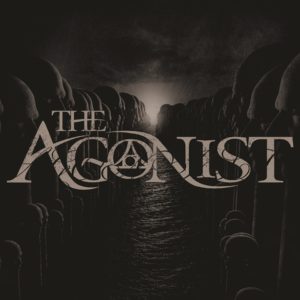
From the moment the first notes reverberate through your soul, it is quite evident that Montreal-based extreme metal band The Agonist have outdone themselves with the insanely intense, powerfully anthemic, and darkly engaging new album, Orphans.
Released Sept. 20 worldwide through Rodeostar Records, the five piece is currently readying for an autumnal assault on Europe, after blasting through summer shows throughout Canada and the United States, riding the popularity of the singles/videos for As One We Survive and Burn It All Down.
The Agonist Is essentially a Canadian band, forming initially in Montreal in 2004, with lead guitarist/songwriter Danny Marino and bassist Chris Kells being the remaining original members. Drummer Simon McKay joined in 2007, followed by Pascal ‘Paco’ Jobin on rhythm guitar in 2010. After the controversial departure of original vocalist Alisa White-Gluz after a decade in 2014 (she went on to replace Angela Gossow in Arch Enemy), Greek-American singer/songwriter Vicky Psarakis took over. In the years since the change, the band has released three albums, including Orphans, continuing to build critical acclaim and a rabid fan base ever since. The band also released three albums with White-Gluz, beginning with their 2007 debut Once Only Imagined.
A resident of Chicago, Psarakis said The Agonist is writing, recording and performing the best music of their careers, and is excited for the future.
“I think where we are today with this new album Orphans is a very good indication of what the band is supposed to sound like and who the band is. I think our personal relationships have also grown over the years. We have always got along, of course, since the first day I joined, and that respect and friendship just intensifies the more you spend time together and tour together. It becomes a family practically. I think a lot of people have said that to us too, that you can see it on stage, how everyone looks happier, everyone looks like they feed off each other’s energy very well. And all that is true. We’re at the point where we are fully comfortable today with who we are as a band, and how we’re moving forward from now on,” said Psarakis, who retains a charming tinge of her Greek accent, after living there for a number of years in her younger days.
 “I was accepted into the band right off the bat, thankfully. I never felt pressure, other than I had to do my job well, but everyone in the band made sure not to add any more pressure over my head. When we all met, we created a friendship first and foremost, and then proceeded to work on music and all that. If there is anything that needs to be said about a song needing work, it is always in a constructive way. So, there has always been that good relationship between us, I always did feel comfortable in the band. I think that the main difference is that five years and three albums later, I feel like it is my band. I don’t feel like I am the new girl in the band anymore.”
“I was accepted into the band right off the bat, thankfully. I never felt pressure, other than I had to do my job well, but everyone in the band made sure not to add any more pressure over my head. When we all met, we created a friendship first and foremost, and then proceeded to work on music and all that. If there is anything that needs to be said about a song needing work, it is always in a constructive way. So, there has always been that good relationship between us, I always did feel comfortable in the band. I think that the main difference is that five years and three albums later, I feel like it is my band. I don’t feel like I am the new girl in the band anymore.”
Psarakis has always loved music, and always had a spectacularly powerful and emotive voice, but didn’t consider music as a vocation as a kid.
“I just remember singing my whole life. In school, teachers would get me to be in all the choirs and in plays and all that because I could sing on key ever since I was really, really young. But it’s not like it was my passion as a kid, it’s just something that I did. And then when I heard metal for the first time I was like, ‘whoa, this is awesome.’ And it just sparked my own interest in songwriting. That’s where it kind of began for me, I wanted to write music and write lyrics and stuff like that. So, I bought a keyboard and taught myself how to play piano and then later on got a couple of tips on how to play guitar so I could at least accomplish all the basics,” she explained.
“I started writing music for myself at that point. I knew that my voice was pretty good, and I saw it was my strong suit, so I really continued to work on my voice. I figured I would just focus on my voice as my instrument and use it to write my melodies and write my lyrics, and it took off from there. [Prior to joining The Agonist, she was in projects called E.V.E. and Rage of Romance, both of which released albums. She was also noted for her YouTube page, offering her interpretation of cover songs.] Like I said, I have been singing my whole life. I only got into the screaming or guttural vocals, or whatever you want to call it, around the age of 25 or 26. When I first got into it, I don’t think I was very good at it because, like a lot of things, you need to work at it. No one just wakes yup one day, and they open their mouth and they can scream, and it sounds good. It takes a lot of work.
“It’s something that I have been doing a lot, being in The Agonist for the past five years now and I truly believe it’s only got really, really good this past year or so. I am just that type of vocalist, I will always try to improve and discover new techniques in singing. Like I said, the scream vocals are something I got into later in life and I only recently feel it’s started sounding good. A couple of years from now, it should be at a way better level than it is now.”
Since the turn of the millennium, and particularly over the past nine or 10 years, female fronted metal bands, and even metal bands with a preponderance of female members, or all-female, have become refreshingly more commonplace. While sexism and misogyny regarding women in the music industry in general, and in metal in particular is still a serious issue, most metal fans of the millennial generation are more interested in the talent and capabilities of female artists, not how pretty or ‘hot’ they may be, as was more prevalent in past generations.

“I think as an industry it will always be male dominated because metal and hard rock has that punch and that aggression, and you know it’s not something that a lot of women could easily get into. But I do love the fact that more and more are getting into it, and I love the fact that they are getting into so many different sub-genres of metal. They are not all in this one certain style. There are women doing so many different vocals styles, and more and more playing guitar and drums and bass in bands. It’s great to see and I think it’s important also because there has been kind of an attitude among certain people that women don’t belong in metal, or whatever,” Psarakis said.
“To me, my attitude has always been you should be pursuing what you’re good at, where your talents really thrive. So, if you’re a phenomenal singer and songwriter and you enjoy metal music, I do not see why you should not be in a metal band or form your own metal band. To me, that’s all it’s ever been about, it’s been about doing the thing that you are really good at and it doesn’t matter what gender you are. Just go for it. I think things have gotten better, but I also believe that the sexism and stuff is still there. My take on this has always been that in the world we live in, people just prefer to look at women. It doesn’t matter if you come out half naked or anything like that. You could be wearing yoga sweatpants and have a pretty face and that confidence in your face gets more attention than looking at men. That’s just the way the world is, and I don’t think that’s ever going to change.
“Obviously it’s okay to be beautiful, but you should always have the talent to back it up. I admire all the women doing it and they are getting all this attention because they are beautiful women, sure. But at the end of the day, they are also phenomenal singers or phenomenal guitar players or drummers or whatever. You can’t help the way you look, you’re born that way, but you can help with how good you are at what you do, and the integrity and work you put into your art. The main focus should be there. To me, looks and just the fact that you’re a woman at centre stage, you don’t even have to be a model or anything like that, it does automatically bring in more attention. But if you’re not able to support what you’re doing with talent and hard work; people are going to leave automatically and never take you seriously. So just getting people to take notice of you will not sustain your career in this industry. You have to back it up with your skills.”
Psarakis uses music and composing lyrics as a way to process emotion, to make commentary on some of the things going on in the world and to use her life experiences to connect with listeners who perhaps have had similar experiences. It’s why fans of The Agonist are ardently loyal, and why the band’s music continues to move not just the heart and spirit, but the minds of all who hear it as well.
“I like writing to the musical track and different songs bring out different emotions in me. For instance, for Orphans a lot of the songs are based on actual real life experiences that I or the band has had. But then there are other songs that are based on fiction or books or movies or whatever. So, I wouldn’t say I have a specific lyrical source that I get my inspiration from. I do think that one contributing factor in any lyric that I write is I always try to write them in a way that people can relate to. Even if I am talking about a specific subject, I make sure to put in a generalization somewhere so that a person can connect with it, even if they don’t know what I am writing about,” she explained.
“I do like to write about different subjects or things that might be hard to see or go through, but I also try to shed a positive light on that because I think its important for people to see that and to feel that to know that no matter what you’re going through, at the end of the day, if you push hard enough you will overcome it and things will be okay. The song As One We Survive is a perfect example of that. And for this song, a majority of the lyrics were written by Danny. He sent the words to me and I sort of filled in the gaps. He wrote those lyrics when we were on tour and we were at that point enduring the most difficult circumstances. Touring can be difficult, but this was a whole other level, where we weren’t getting any sleep, we were barely eating because we were in a country where it was hard to just go out and get stuff for ourselves, so we were relying on promoters. There were whole days when we would only eat like an hour before the show at the venue.
“And I was feeling super sick and we had also gotten some bad news around that time about the band. So, our morale was in the ground. But Danny wrote those lyrics because we did push through it and we stayed strong and stayed together and kept each other up. That’s what the song was based on. But it’s written in a way that anyone can relate to it. Anyone can look at those lyrics and look at their own life and some terribly trying things that they were going through, that they overcame, or they could still be going through, and see there is hope and to stay strong. If I can get people to relate to any song on that level, I am extremely happy about proud about that.”
Another superlative track on the album is the intense and provocative Burn it All Down.
“That was actually based on a book, a fiction book, but I did really like the story. The book was written in the 1960s and is called We Have Always Lived in the Castle by Shirley Jackson and, again there are a couple of references here and there in the verses. There is part of the book, and I don’t want to give away too much, where there are two girls and their house is burning but they escape. The fire goes out and then it turns out that their house is mostly still standing but the roof is missing. There is wear and tear and damage, but it is still liveable. They decide to keep living there, and in the description the house now looks like a castle and the roof is gone, so they can see the sky,” Psarakis explained.
“I thought it was an extremely positive and beautiful ending to such a morbid story, and that is why I decided to use a few key parts of the book in this song, where I say, ‘burn it all down, so at last we will see the sky.’ And that can be literal, like it was in the book, or it can be metaphorical. It can be about bringing down something that has been burdening you or troubling you or whatever, so that you can finally breathe. It’s basically about finding that positive light in a very unfortunate situation.”
For more information on Orphans, the band and tour dates, visit www.theagonistband.com.
- Jim Barber is a veteran award-winning journalist and author based in Napanee, ON, who has been writing about music and musicians for a quarter of a century. Besides his journalistic endeavours, he now works as a communications and marketing specialist. Contact him at jimbarberwritingservices@gmail.com.
SHARE THIS POST:
